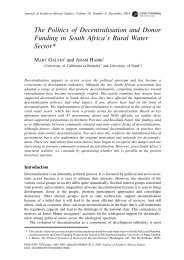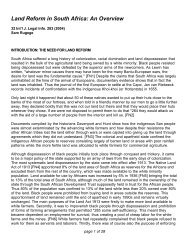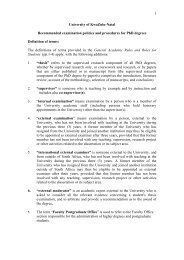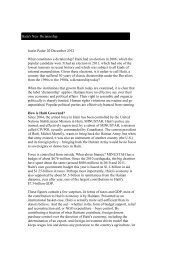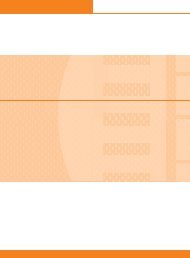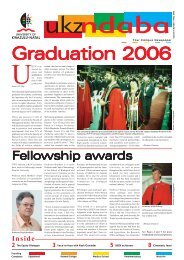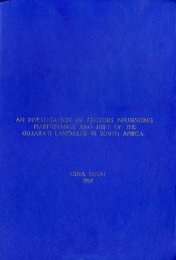Member Booklet - UKZN Retirement Fund - University of KwaZulu ...
Member Booklet - UKZN Retirement Fund - University of KwaZulu ...
Member Booklet - UKZN Retirement Fund - University of KwaZulu ...
Create successful ePaper yourself
Turn your PDF publications into a flip-book with our unique Google optimized e-Paper software.
4. RETIREMENT BENEFITS<br />
4.1 NORMAL RETIREMENT DATE<br />
Your Normal <strong>Retirement</strong> Date is the last day <strong>of</strong> the year in which you<br />
reach age 60, unless a later date is specified in your contract <strong>of</strong><br />
appointment.<br />
4.2 EARLY RETIREMENT<br />
Provided your application for early retirement is approved by the<br />
<strong>University</strong> <strong>of</strong> <strong>KwaZulu</strong>-Natal, you may retire from the <strong>Fund</strong> at any<br />
time after reaching age 55. It is important to remember that if you<br />
retire early, you will have less money saved than if you retired on<br />
your Normal <strong>Retirement</strong> Date, and your <strong>Fund</strong> Credit will have to<br />
generate retirement income for a longer period. It is in your interests<br />
to consult a financial advisor before making this decision.<br />
If at a younger age than 55 you become totally and permanently disabled, you would be entitled to<br />
receive your <strong>Fund</strong> Credit as an early retirement benefit, and would be allowed to claim the same<br />
tax-free portion <strong>of</strong> your benefit as if you had retired at the normal retirement date.<br />
4.3 LATE RETIREMENT<br />
You may only remain a member <strong>of</strong> the <strong>Fund</strong> beyond you Normal <strong>Retirement</strong> Date if your Employer<br />
requests this and issues you with a contact, which states that your <strong>Fund</strong> membership will continue. In<br />
this case you may stay on as a member <strong>of</strong> the <strong>Fund</strong> to a maximum <strong>of</strong> age 70, when you will have to<br />
retire.<br />
4.4 BENEFIT PAYMENT OPTIONS AT RETIREMENT DATE<br />
At your <strong>Retirement</strong> Date, you have the choice <strong>of</strong> your <strong>Fund</strong> Credit being paid as: a) an annuity,<br />
taken out in your own name b) a cash transfer or c) a combination <strong>of</strong> these two options.<br />
Purchasing an annuity at retirement involves entering into an agreement with a Registered Insurer,<br />
to provide you with monthly income (a pension) for life. The amount you receive will depend on the<br />
capital amount you have available at retirement, and the type <strong>of</strong> annuity you decide to purchase.<br />
If you buy an annuity with any portion <strong>of</strong> your <strong>Fund</strong> Credit, you will not pay tax on that portion <strong>of</strong><br />
your retirement benefit at the time <strong>of</strong> your retirement. You will be paid a monthly income by the<br />
insurer from which you purchase the annuity, which will be taxed in the same way your salary is<br />
currently taxed.<br />
You will pay tax on any amount that you decide to take as a cash lump sum, that exceeds the taxfree<br />
portion (R315 000 in 2013, but updated from time to time).<br />
Please refer to Section 9 for the taxation implications <strong>of</strong> taking a cash payment at retirement.<br />
It is important that you obtain advice and consider all the alternatives before deciding on<br />
the payment <strong>of</strong> your retirement benefit.<br />
Transfer to a preservation fund is only available on resignation, retrenchment or dismissal. If you<br />
are retiring from the <strong>University</strong> you may not transfer your lump sum to a preservation fund.<br />
- 8 -




